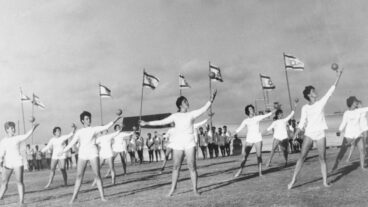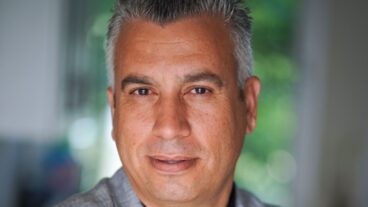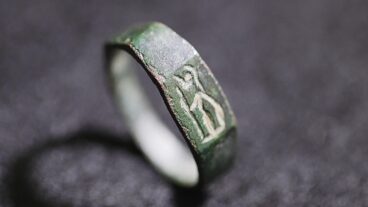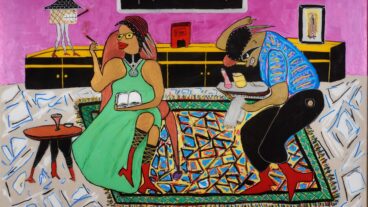Hundreds of American volunteers endangered their lives, and their US citizenship by fighting alongside Israel in 1948.”I remember a time when our members used to pack this hall to capacity,” says Arthur Bernstein, former chairman of American Veterans for Israel (AVI), as he glanced around the sparsely populated hall in the B’nai Zion complex in Manhattan one Sunday. “I salute all of those who are not with us, and remember them today.”
The meeting was the organization’s final official one, gathering together a handful of surviving AVI members for a brief and heartfelt ceremony marking the takeover of the organization by a newly appointed board of trustees, AVI Legacy. “In recent years we have been publishing more obituaries and delivering more eulogies than we care to,” says Bernstein. “The circle of friends is shrinking. History is now being made without us. But we have managed to leave a footprint on the historical record.”
American Veterans for Israel was established in 1963 by the 1,210 of 1,250 Jewish and Christian Americans and Canadians who survived their volunteer service in defense of Israel during the establishment of the state, from 1948-9.
These volunteers, many of whom had served in the American military during WWII, not only endangered their lives, but also jeopardized their civil rights by violating the terms of their American passports (the US had imposed a military embargo against Israel) to serve in all branches of the emerging Israel Defense Force, often in key positions of command.
They brought invaluable experience and expertise to Machal, pre-state infantry units, and Aliyah Bet, a movement of 10 clandestine ships that altogether shuttled 31,000 so-called illegal immigrants, and Holocaust survivors from Europe, to the shores of Palestine.
They were among 3,500 volunteers from 46 countries who came to help defend Israel after she declared independence in 1948, and was promptly attacked by the armies of all six surrounding countries.
“The ‘Machalnics’ served in the best American tradition, the people’s struggle for freedom,” said Si Spiegelman, AVI’s outgoing executive vice president, who after losing almost his entire extended family in Poland during the Holocaust, traveled to Israel in 1948, where he spent a year and a half collecting arms for the Hagana and helping to smuggle in US fighter pilots. “The memory of Machal needs to be passed on as a legacy to present and future generations. In order to ensure this continuity, today we place the torch in the hands of our trustees.”
Spiegelman was joined at the ceremony by a few other 1948 Israel vets. Naomi Kantey, 83, from New York, served as a nurse for the Hagana and after statehood was declared, became an officer of the IDF. After working as a nurse in a naval hospital in Long Island treating WWII veterans, she snuck onto a clandestine ship, the Marine Club, in December 1947, a month after the UN passed its Partition Plan for Palestine. “Originally, I wanted to go to Europe to help the survivors of the Holocaust,” said Kantey, “But when the unrest began in Israel, I thought my military experience would be put to better use there.”
In the two years following her arrival to Palestine, Kantey served in locations across the country, at all sites of the most intense battles. “I was happy to help in whatever way I could,” she says. A few years after returning to the US, she and her husband, an Israeli vet from South Africa, began visiting Israel annually. “At first we couldn’t afford it,” she says. “But after a few years we started going. I left a big chunk of myself there. It is still there.”
George Goldman, 87, from Teaneck, New Jersey, was part of the Aliyah Bet movement. After serving with the US Merchant Marines, shipping war materials to the fighting fronts, Goldman snuck out of the US on the Geula, a ship that carried 1,388 Holocaust survivors from Bulgaria, Poland, Romania, and Hungary, to Palestine in 1947. At the Haifa port the ship was detained, its passengers transferred by the British forces onto a prisoner ship bound for a detention camp in Cyprus, where Goldman and his shipmates spent seven weeks until the Hagana busted them out. “After we understood what had happened in Europe, I realized that my part in the war wasn’t over yet,” says Goldman. “So, I volunteered.”
Since the war, Goldman only returned to Israel once, five years ago, with an AVI-organized tour. “There was always work to do and bills to pay,” he says. “But to this day, I am a supporter of Israel, all the way.”
Phillip Strauss, 87, also a former US Merchant Marine man, helped to organize the Israeli navy. After working on a Canadian Aliyah Bet ship docked in Brooklyn, he managed to fly to Israel and volunteer at the Haifa port, where it was his job to plan the logistics of the future naval forces. He was one of the navy’s first officers; the ship he had worked on in Brooklyn later became one of the navy’s first ships.
“Volunteering made me feel very Jewish,” says Strauss, who has visited Israel almost every year since he returned to the US in January, 1949. “I think Israel is fabulous. It’s beautiful. I love Israel and I will give her all the help I can, in every way possible,” he said. “I am proud of the strong connection that still exists between our two great countries.”
Maintaining this historical connection between AVI and contemporary Israel will be one of the many charges of the new board of trustees. AVI Legacy, comprised of five individuals, will also be charged with remembrance in the US, in addition to all management functions of the organization. They will continue to hold an annual ceremony at West Point in honor of fallen American veteran for Israel, David “Mickey” Marcus, “A Soldier for all Humanity”, as his epitaph reads, and the only war vet buried at the military cemetery who did not fall in an American war.
AVI Legacy will maintain the organization’s website along with its archives and museum at the University of Florida in Gainesville.
“I am honored and humbled to be your representative. I guarantee we will work our hardest to keep this history, your legacy, alive,” said Jeffrey Margolis, incoming chairman of AVI Legacy. “We are dedicated to promoting the legacy of brave heroes and heroines, without whom I think many would agree, there would be no state of Israel today.”
The AVI legacy will also be carried on by a new organization, Aluf Stone, which has as its mandate the ingathering of all North American Machal volunteers, from all years of service.
“We wanted to create a support network for current volunteers, a place where they can seek fellowship and counsel when they return home from their service and are having trouble readjusting to civilian life in America,” explained co-founder of Aluf Stone, Matthew Ronen, 26, who served as a volunteer in an infantry unit of the IDF from 2004-6.
His partner, Marc Leibowitz served from 1992-4. “We think of our group as a successor of AVI. We want to preserve the history of the 1948 vets, and to continue in the spirit of the amazing tradition they started, of contributing to the defense of Israel in really meaningful ways.”
“It is very touching to me that this same passion for Israel and sense of obligation to her future still exists among some American Jewish youth, and that today’s generation is doing what we did,” says Spiegelman. “I feel wonderful about our continuity with AVI Legacy and Aluf Stone. Our history is in good hands.”












